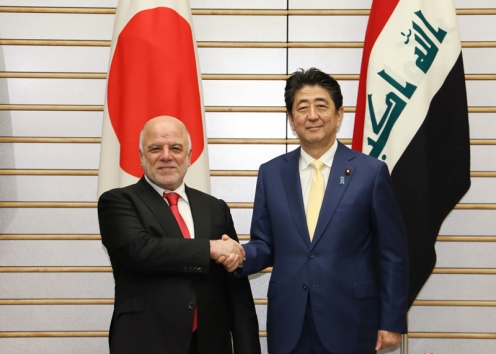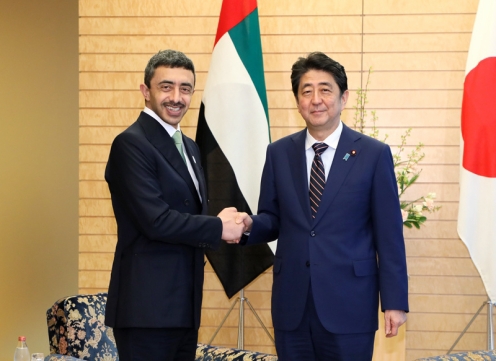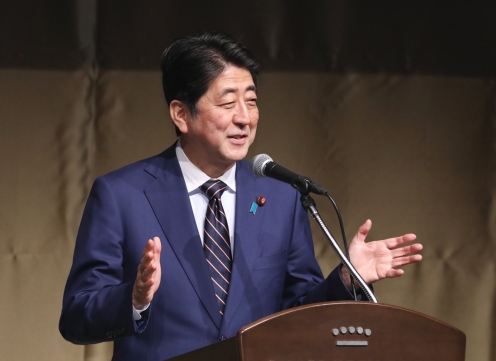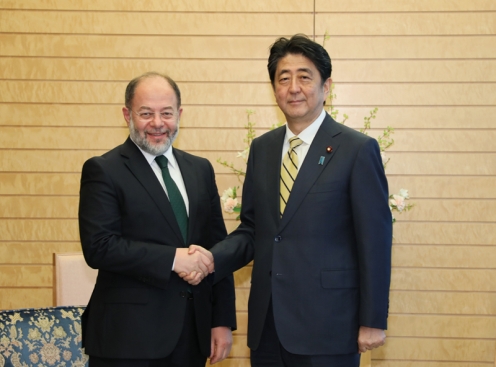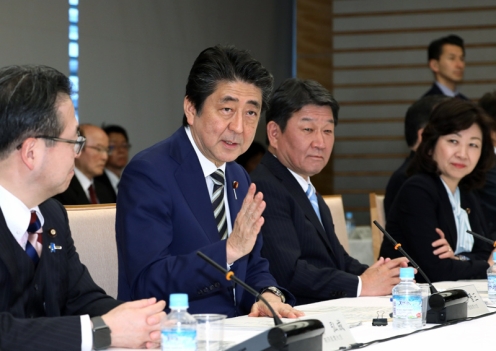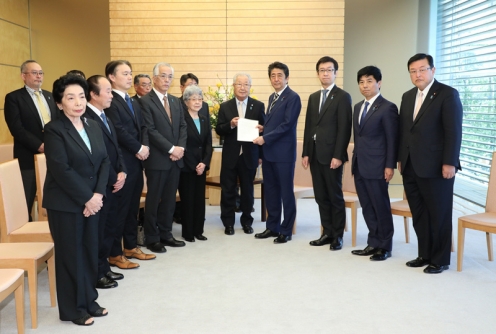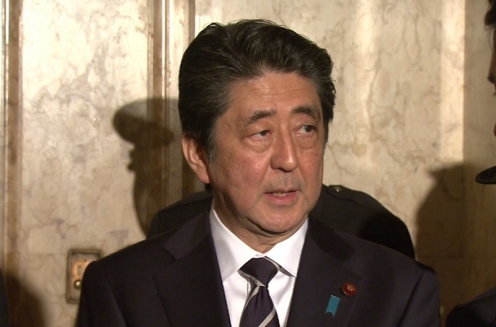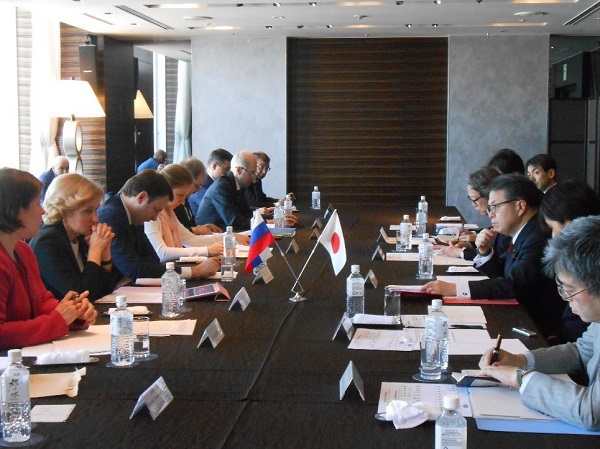Japan-Iraq Summit Meeting and Other Events
Cabinet Secretariat, Thursday, April 5, 2018
[Provisional Translation]
On April 5, 2018, Prime Minister Shinzo Abe hosted a summit meeting and other events with H.E. Dr. Haider Al-Abadi, Prime Minister of the Republic of Iraq, at the Prime Minister’s Office.
The two leaders attended a salute and guard of honor ceremony, followed by a summit meeting. Thereafter, the leaders held a joint press announcement.
Courtesy Call from the Minister of Foreign Affairs and International Cooperation of the United Arab Emirates
Cabinet Secretariat, Tuesday, April 3, 2018
[Provisional Translation]
On April 3, 2018, Prime Minister Shinzo Abe received a courtesy call from H.H. Sheikh Abdullah bin Zayed Al Nahyan, Minister of Foreign Affairs and International Cooperation of the United Arab Emirates, at the Prime Minister’s Office.
Arab Japan Day Reception
Cabinet Secretariat, Tuesday, April 3, 2018
[Provisional Translation]
On April 3, 2018, Prime Minister Shinzo Abe attended the Arab Japan Day Reception held in Tokyo.
The Prime Minister said in his address,
“I would like to offer my heartfelt congratulations for the Arab Japan Day Reception. I would like to express my respect for the hard work of H.E. Mr. Rachad Bouhlal, Ambassador of the Kingdom of Morocco to Japan, and all the parties involved.
As I promised last year, I have set a new record by attending this reception for the fifth time as Prime Minister.
By just looking at everyone who is present here tonight, I realize anew the breadth of cordial relations between Japan and the Arab region.
The era when Japan and Arab countries only interact with each other through the energy sector is now a thing of the past. Since I assumed office as Prime Minister, I have visited a total of 11 countries and regions over six trips with the aim of building a comprehensive relationship with Arab countries across a wide range of fields, including politics, the economy, security, culture, and society.
The day after tomorrow, I will welcome Prime Minister Al-Abadi to Tokyo and hold a meeting on the improvement of the security situation in Iraq. At the same time, I would also like to engage in a meaningful exchange of views on job training, job creation, and weapon collection.
The best way is in the middle. This ancestral wisdom of the Middle East is also my philosophy for Middle East diplomacy. In the aspects of placing importance on tradition and valuing moderation, Japan and the Middle East share commonalities in our fundamental approaches to life.
Respect for diversity and tolerance are of great importance. Our response to violent extremism including ISIL, Syrian refugees, and other issues is not limited to emergency and humanitarian assistance. From a medium- to long-term perspective, we also work to support nation-building and human resource development, which form the basis for reaching a fundamental solution for these issues.
The peace process in the Middle East is a crucial issue not only for the stability of the region but also for the international community. Japan has consistently supported the two-state solution. Going forward, we will continue to contribute to trust building among the parties involved through various initiatives such as the “Corridor for Peace and Prosperity,” and to work tirelessly toward the realization of peace in the Middle East.
There is infinite potential for the relations between Japan and Arab countries. In closing my remarks, I would like to affirm our commitment to walking together with Arab countries toward a bright future. Thank you.”
Courtesy Call from the Deputy Prime Minister of Turkey
Cabinet Secretariat, Wednesday, April 4, 2018
[Provisional Translation]
On April 4, 2018, Prime Minister Shinzo Abe received a courtesy call from H.E. Prof. Dr. Recep Akdağ, Deputy Prime Minister of the Republic of Turkey, at the Prime Minister’s Office.
Courtesy Call from the Minister of External Affairs of India
Cabinet Secretariat, Friday, March 30, 2018
[Provisional Translation]
On March 30, 2018, Prime Minister Shinzo Abe received a courtesy call from H.E. Ms. Sushma Swaraj, Minister of External Affairs of India, at the Prime Minister’s Office.
Council on Investments for the Future
Cabinet Secretariat, Friday, March 30, 2018
[Provisional Translation]
On March 30, 2018, Prime Minister Shinzo Abe held the 14th meeting of the Council on Investments for the Future at the Prime Minister’s Office.
At the meeting, there was discussion on the mobility revolution (autonomous driving) under Society 5.0 and productivity revolutions from governmental organizations.
Based on the discussion, the Prime Minister said,
“By the time of the 2020 Tokyo Olympic and Paralympic Games, we will realize an autonomous driving society. The public and private sectors have worked together to conduct demonstration tests towards achieving this major goal. We are now about to enter the business development stage. We will further accelerate various initiatives with the aim of facilitating the development of diverse businesses. Such initiatives include the establishment of a zone in the seaside area of Tokyo for tests of safer autonomous driving technologies integrating traffic signal information.
Today, Minister Matsuyama compiled for us a set of guidelines on the direction for the development of safety regulations, traffic rules, and other standards for the commercialization of autonomous driving. Autonomous driving will be a major asset for the productivity revolution. I want the relevant ministries and agencies to begin preparation for legislation aiming at a safe and sound autonomous driving society, and actively take the lead in the creation of international rules. In strongly advancing the productivity revolution, let us first ‘practice what we preach’ Government organizations must proactively make use of the latest technology and work to thoroughly improve productivity themselves.
Please hasten discussions toward the early submission of the ‘Digital First’ bill, which includes measures such as exemption from the submission of additional attached documents.
Despite the great advances in technology in this day and age, when people move houses, they still have to write the same information in 20 different places. This is a very specific example, as it just so happens that one of my executive secretaries recently moved and had to write the same information several times.
Processing taxes and social security documents for their employees are large burdens for many companies, especially small- and medium-sized enterprises. These burdens stifle productivity improvements in companies.
We must look at administrative procedures from the viewpoints of citizens, who are the ones who receive governmental services, and work to overcome silos in such procedures. We will prioritize the procedures for deaths, inheritance, and the establishment of corporations as core projects, and, starting from next year, work to enable the completion of these procedures online and in one place by FY2020. Please proceed thoroughly with these reforms from a user-oriented perspective, including initiatives that will make it possible for users to allow the verification of their identification with their smartphones.
I want the IT Strategic Headquarters to act as a control tower and eliminate vertical segmentation, and I want the relevant ministries and agencies to work as one to strongly promote the productivity revolution at the national and local levels.”
Meeting with Families of Abductees and Others
Cabinet Secretariat, Friday, March 30, 2018
[Provisional Translation]
On March 30, 2018, Prime Minister Shinzo Abe held a meeting with families of abductees and others at the Prime Minister's Office.
The Prime Minister said in his address,
“Just now, you presented me with a resolution. In relation to North Korea’s nuclear and missile issues, North Korea has begun to seek dialogue from its side under circumstances in which we have been working together with the international community to firmly increase the pressure on North Korea to the maximum level and ensuring that there are no loopholes. I highly value this very change in North Korea’s attitude.
Next month, a summit meeting between the Republic of Korea and North Korea is scheduled to be held. After that, it is expected that the United States and North Korea will hold a summit meeting. The abduction issue, upon which Japan places the utmost importance, will absolutely not be neglected.
In that regard, I held summit telephone talks with President Trump on April 9, and President Moon on April 16. I told both of them that, from the perspective of Japan, parties must find a way to resolve the abduction issue, and asked them to thoroughly discuss this issue with North Korea and call on it to take action.
Several months ago, when President Trump visited Japan, he took time to meet with Ms. Hitomi Soga, a former abductee, and with family members of other abductees. I told President Trump that you were all deeply moved by this opportunity. In response, he said to me that he understood very well what I wanted to say.
Next month, I will visit the United States and hold a summit meeting with President Trump. I intend to have a thorough discussion on the issues related to North Korea. In particular, I will again explain the position of Japan on the abduction issue. Furthermore, I will explain that it is necessary that the United States also raise the importance of this issue with North Korea and discuss steps towards its resolution. That is what I intend to do.
In any case, in 2002, the five abductees returned to Japan. They arrived at Haneda Airport. They once again had a chance to hold their families tight. I will exert every possible effort to ensure that all of you will also have the same opportunity to hold your children and your family members tight once again. My mission will not be complete until that day comes. The Abe administration will move forward with that resolve and settle this issue once and for all. I am determined to realize the return of all victims to Japan.”
Press Occasion on the FY2018 Budget
Cabinet Secretariat, Wednesday, March 28, 2018
[Provisional Translation]
On March 28, 2018, Prime Minister Shinzo Abe held a press occasion on the FY2018 budget at the Diet.
The Prime Minister said the following,
“The issue concerning the alteration of the documents by the Ministry of Finance has shaken the confidence of the public in the government, and I feel deeply responsible as the head of the government. Once again, I would like to express my apology to the people. We will conduct a thorough investigation, uncover the whole truth, and clean out the stables. Beyond that, we will rebuild our organization to ensure that such incidents do not happen again.
Until now, I have consistently advocated that the early passage of the budget for the coming fiscal year is itself the most important stimulus to the economy. In this year’s ‘spring offensive (spring wage negotiations),’ many companies raised their pay scales and many of them increased their wages more significantly compared with last year. Under such circumstances, we will swiftly execute this budget so that the warm winds of economic recovery can reach small businesses, small- and medium sized enterprises (SMEs), and each region.
I have also called this Diet the ‘Work Style Diet.’ I would like to make Japan a country that offers an ideal work environment for all the people, no matter what circumstances they face.
Moreover, this budget incorporates items to enrich nursing care and childcare services, as well as those to expand scholarship grants. Hence, we will surely work on enriching and expanding these services and programs.
Next month, I will visit the United States to hold a Japan-U.S. summit meeting. In May, I will also visit Russia and meet with President Putin, followed by the G7 summit meeting in June where I will meet with the leaders. As I carry out active diplomacy that takes a panoramic perspective of the world map, I will exert every effort towards resolving North Korea’s nuclear and missile issues, major issues for Japan, and above all, the abduction issue.”
Congratulatory Message from Prime Minister Abe to the New President of Myanmar Win Myint
Foreign Affairs, Friday, March 30, 2018
1. On March 30 (same day local time), following the announcement of the appointment of the His Excellency U Win Myint, Member of the Central Executive Committee of the National League for Democracy and former Speaker of the Pyithu Hluttaw, as the new President of the Republic of the Union of Myanmar, Mr. Shinzo Abe, Prime Minister of Japan, sent a congratulatory message to President Win Myint.
2. In his congratulatory message, Prime Minister Abe conveyed his will, based on Japan’s longstanding friendship with Myanmar, to provide full-fledged support for Myanmar’s democratic nation-building efforts and to work together with new President Win Myint for the stability and prosperity of the whole region.
Extraordinary Press Conference by Foreign Minister Taro Kono
Foreign Affairs, Friday, March 30, 2018
Opening Remarks
Mr. Taro Kono, Minister for Foreign Affairs: Throughout yesterday and today, I have held telephone talks with Boris Johnson, Secretary of State for Foreign and Commonwealth Affairs of the United Kingdom, Heiko Maas, Federal Minister for Foreign Affairs of Germany, Jean-Yves Le Drian, Minister for Europe and Foreign Affairs of France, Kang Kyung-wha, Minister of Foreign Affairs of the Republic of Korea (ROK), and just now with Deputy Secretary of State John Sullivan who is serving as acting Secretary of State of the United States.
In the series of telephone talks, regarding the issue of North Korea, based on past experience, I confirmed once again with the international community that the international community must maintain maximum pressure going forward to ensure that North Korea abandons all nuclear and ballistic missile programs in a complete, verifiable, and irreversible manner.
Furthermore, I reached agreement with Foreign Minister Kang and Deputy Secretary of State Sullivan to closely cooperate to elicit concrete actions from North Korea in the lead up to the inter-Korean summit meeting on April 27 and the U.S.-North Korea summit meeting to be held by the end of May. In addition, we agreed that Japan, the U.S. and the ROK would continue to cooperate for resolution of the abductions issue.
When advancing this united response of the international community regarding the North Korea issue, cooperation with the major countries of the United Kingdom, Germany, and France is extremely important, and I confirmed once again with each of the foreign ministers the necessity of a response to the avoidance of sanctions by North Korea, including the handling of “ship to ship transfers,” etc.
Furthermore, in addition to North Korea, I discussed the attack on a former Russian intelligence officer in the United Kingdom and the Nuclear Agreement with Iran with the foreign ministers of each country except the Republic of Korea.
Question-and-Answer Session
Reporter: Recently there was a summit meeting between China and North Korea. Were you given any information about that by the Republic of Korea’s Ms. Kang Kyung-wha or Mr. Sullivan?
Minister Kono: I have received a quite careful brief from China about the China-North Korea summit meeting, and I analyzed the information exchanges, etc. regarding both the China-North Korea summit meeting and the talks on the inter-Korean preparatory meetings.
Reporter: What did Ms. Kang Kyung-wha say about the inter-Korean summit meeting?
Minister Kono: The situation is that now preparatory meetings are being held for the inter-Korean summit meeting.
Reporter: In relation to the Russian spy incident, were there any calls from the European countries for Japan to expel diplomats as well?
Minister Kono: None of the countries said anything in particular about the response of Japan. Regarding this issue, each country shares concerns regarding the fact that the threshold for the use of chemical weapons has been lowered, so I think there will be discussion concerning these matters with these countries at the G7 Foreign Ministers’ Meeting as well.
Reporter: Please tell us about the timing and aims of holding this series of telephone talks intensively yesterday and today, the issues in common with the counterpart countries, and your aims, that is, why did you talking with those countries?
Minister Kono: Firstly, there have been developments regarding the North Korea issue so it is necessary to have a variety of information exchanges within the international community to maintain pressure as an international community, and furthermore carry out confirmation from these countries to other countries as well. In addition to that, although this was a while ago, as you know I received a telephone call from the foreign minister of Sweden, and held various exchanges of views regarding the visit of the foreign minister of North Korea, so in the context that various foreign countries are having dialogue with North Korea, we shared the joint perception that even if North Korea comes to talk it does not mean that anything will be gained.
Reporter: You said you received a careful brief from China about the China-North Korea summit meeting. A little more specifically, how were you briefed in a concrete manner? Furthermore, did you talk about Takeshima or the comfort women issue with Foreign Minister Kang?
Minister Kono: I have received a brief from China, but I will refrain from commenting on its content or any other related matters. Foreign Minister Kang explained the position of the Republic of Korea regarding the matter of the curriculum guidelines of the Ministry of Education, Culture, Sports, Science and Technology, and I conveyed the position of Japan in a firm manner.
Reporter: Did you talk about the comfort women issue?
Minister Kono: No.
Reporter: You said you received a brief from China. Of course China has a close relationship with North Korea so I think that perhaps you intend to have high-level dialogue directly with Foreign Minister Wang Yi, etc., and you had a Foreign Ministers’ Meeting with Russia just the other day, but do you think it is necessary to talk to China and Russia again?
Minister Kono: I think I will probably have an opportunity to meet with Foreign Minister Wang Yi in the near future. We are holding exchanges with China at a variety of levels, so I think that is probably what will happen.
Reporter: In today’s Committee on Foreign Affairs of the House of Representatives, you mentioned that North Korea’s intentions regarding denuclearization were not revealed. What kind of exchanges did you have with the Republic of Korea and the United States?
Minister Kono: I have held exchanges with a variety of countries regarding the fact that North Korea’s intentions regarding denuclearization are extremely unclear. There is no mention of the denuclearization of North Korea externally, and activity is continuing at the nuclear facilities, so we must see if the commitment is really only words or will lead to action. All of the countries in the international community share the perception that even if North Korea comes to have dialogue, it does not mean that anything will be gained, so this must be clarified with respect to North Korea.
Reporter: The topic of North Korea’s intentions regarding denuclearization was discussed again today in the Committee on Foreign Affairs. It just wasn’t revealed. What kinds of exchanges did you have with the United States and the Republic of Korea in particular?
Minister Kono: I have held exchanges with a variety of countries regarding the fact that North Korea’s intentions are extremely unclear at the present time. There is no mention of the denuclearization of North Korea externally and it is reported that activity is continuing at the nuclear facilities, so of course we must carefully see if North Korea’s commitment to denuclearization is really only words or will lead to action. All of the international community, all countries shared the perception that even if North Korea comes to have dialogue, it does not mean that anything will be gained, so this must be clarified with respect to North Korea.
Reporter: In your telephone talks with the United States and the Republic of Korea, was there any reaction from your counterparts regarding taking up the abductions issue at the summit meetings?
Minister Kono: I have heard a variety of comments from my counterparts regarding the abductions issue. Nothing has been finalized about the items on the agenda or the approach at each summit meeting, so I will refrain from commenting on their content.
Reporter: Do you mean that it was mentioned by your counterparts?
Minister Kono: I have heard a variety of comments from my counterparts about the abductions issue but I will refrain from commenting on their content.
Reporter: Do you mean that you reached agreement with the foreign ministers of Germany, France, the United Kingdom, and the Republic of Korea, as well as the acting secretary of the United States with whom you held the talks you mentioned in your opening remarks, with all of them, regarding the three conditions for denuclearization, namely that it be complete, irreversible, and verifiable?
Minister Kono: That has already been agreed by the international community.
METI Minister Seko Visits Osaka Prefecture
METI, Monday, March 26, 2018
On March 24 (Sat.), 2018, Mr. Hiroshige Seko, Minister of Economy, Trade and Industry and Minister for Economic Cooperation with Russia, visited Osaka Prefecture and held meetings with H.E. Ms. Olga Golodets, Deputy Prime Minister of the Russian Federation, and H.E. Mr. Maksim Stanislavovich Oreshkin, Minister of Economic Development and Special Representative for Trade and Economic Cooperation with Japan of Russia. Following the meeting, Minister Seko attended a kick-off symposium held by Kindai University titled “Inter-University Exchange Project – Human Resource Program for Monodukuri Engineer in Japan and Russia-.”
1. Meeting with Deputy Prime Minister Golodets
At the meeting with Deputy Prime Minister Golodets, bearing in mind Prime Minister Abe’s visit to Russia scheduled in May 2018, both countries focused on the eight-point cooperation plan and held discussions concerning the current situation of Japan-Russia cooperation in the fields of medical care, education and cultural exchange where Deputy Prime Minister Golodets is in charge as well as future policies thereof.
2. Meeting with Minister Oreshkin
At the meeting with Minister Oreshkin, following on from the Japan-Russia High-Level Working Group held on February 22, 2018, the two sides held discussions on efforts for further specifying the eight-point cooperation plan, including improvement of labor productivity and the digital economy.
Both ministers agreed that the two countries will aim to implement as many as projects under the plan as specific actions and make the outcomes of the cooperation visible to the public in both countries and that to this end, they will accelerate efforts involving Prime Minister Abe’s visit to Russia scheduled in May 2018.
3. Attending a kick-off symposium held by Kindai University
As a selected university participating in the Inter-University Exchange Project organized by the Ministry of Education, Culture, Sports, Science and Technology, Kindai University held a kick-off symposium as part of its Program for Human Resource Program for Monodukuri Engineer in Japan and Russia. Minister Seko attended the symposium and delivered a speech on the importance of Japan-Russia cooperation in the field of human resource exchange under the eight-point cooperation plan, showing his expectations for the new program.
JPO Status Report 2018 Compiled
METI, Thursday, March 29, 2018
The Japan Patent Office (JPO) hereby announces the release of the JPO Status Report 2018, a compilation of the JPO’s latest initiatives and statistical information. The report states that the number of applications for patents, designs and trademarks and international applications in 2017 respectively increased from the previous year and, in particular, the number of patents applications increased for the first time in five years.
This report aims to deliver such information to people inside and outside Japan, and to this end, thoroughly describes it in both Japanese and English.
Part 1 Facts and Figures on Trends in Intellectual Property
Chapter 1 Trends in Intellectual Property in Japan
Statistical information on patent, design and trademark applications filed with the JPO and registration therein (e.g., changes in the number of applications, top 10 companies with the most number of registrations, etc.)
Chapter 2 Trends in Intellectual Property Worldwide
Statistical information on patent, design and trademark applications filed with IP5 offices (JPO, USPTO, EPO, SIPO and KIPO) and registration therein
Part 2 2017 Policy Outcomes
Chapter 1 Examinations/Trials and Appeals
JPO’s initiatives for the speed of examinations/trials and appeals, improvement of the quality thereof, etc.
Chapter 2 International Initiatives
JPO’s cooperation with other IP offices and related organizations and international initiatives among IP offices for harmonization of IP systems and operations
Chapter 3 Support Measures, Law Amendments, etc.
JPO’s initiatives for supporting SMEs, universities, etc. and those involving law amendments and standard essential patents
Examination, Appeals, Trials, and Opposition Flow Chart, Schedule of Fees, Contact Information, etc.
Information on the flow chart from filing applications to registration or trials, a schedule of fees, information on contact counters of the JPO and other related organizations, etc

























